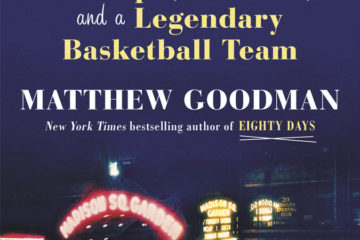College theatres explore Shoah

By Marc Katz, Special To The Dayton Jewish Observer
Two college theatre productions dealing with Holocaust themes come to area stages this month, plumbing coincidental learning experiences for both performers and audiences.
In addition to training theatre students and entertaining audiences, these productions — Wright State’s The Magic Fire by Lillian Groag and Sinclair’s A Shayna Maidel by Barbara Lebow — contain educational themes as well.
“For me as a director, the thing that captivated me about the play (The Magic Fire) is it is so intensely rich with ideas,” said Lee Merrill Hapner, director of the play at WSU. “I see the capacity of theatre to change people, to challenge them…provoke them; not merely entertain them. But to shake them up and make them pay attention. And make them wake up and transform them.”
Because Hapner is also in a university setting, she doesn’t want to waste the opportunities for learning, especially with the play she has, involving a family that escaped the Nazis in Europe and ends up in Argentina, where the fascist Peron dictatorship has taken over. A boy, trying to get away, wants the newly-arrived European family to take him in.
It is the bystander dilemma all over again.
“Oh my gosh, yes,” Hapner said when asked if there was a learning component beyond theatre, “about ideas and the world. We invested the first two weeks (in play preparation) talking about (events in the play). These kids don’t know anything about opera, and there’s all the historical references. It’s no longer a world about McDonalds and blue jeans and hip hop.
“The play invites you into caring about something more than what is familiar in this tiny, tiny little world that we live in,” Hapner said. “That’s not only the function of theatre in an educational institution, but the function of theatre in our society.”
The Magic Fire begins with the central family, the Bergs, listening to a bit of Puccini’s Tosca, which is never explained, but deals with a political prisoner fleeing from a repressive government in Italy in the year 1800.
There are also references to Wagner’s operas throughout the play. Even though Wagner died in the 19th century, he was a favorite of the Nazis, who particularly delighted in his anti-Jewish writings.
“It’s a very complex play,” Hapner said.
She helped choose the production from a pile of plays WSU Theatre Department Chair W. Stuart McDowell handed her more than a year ago.
“The one on top,” he said, “now this one should have won a Pulitzer Prize.”
For Gina Neuerer, director of theatre at Sinclair, it had been eight years since the community college put on a play with a Holocaust theme. It was time to visit that emotional historic black hole again.

“We have a rotation of the types of plays we offer,” Neuerer said. “We want to make sure we’re dealing with diversity, the social issues.
“It’s important to our kids and our audience to be exposed to that. We do a lot of docudramas.”
Sinclair has produced The Laramie Project, The Women of Lockerbie, and now wants to do that with A Shayna Maidel.
“We try to make sure we’re doing plays that have this dramaturgical approach to them,” Neuerer said, “where our students are going to learn something about history.”
A Shayna Maidel (Yiddish for a pretty girl) is about two sisters who grew up apart: one escaping Europe prior to the Nazi takeover, the other left behind.
After the war, they reunite for the first time in 20 years, with completely different experiences.
To ensure the learning experience, Neuerer and director Kimberly Borst took the cast (four students, a teacher and local actor Saul Caplan) to The Center for Holocaust and Humanity Education on the campus of Hebrew Union College-Jewish Institute of Religion in Cincinnati.
Sinclair Theatre, in partnership with Sinclair’s Holocaust Remembrance Committee, will present three exhibits about the Holocaust and a cast panel discussion during the run of the show (see details below).
“They’re not just in a play,” Neuerer said. “They’re not just reading it in a textbook, not just taking a class about it. Now, they’re deeply involved.”
Borst said it’s important to put research into every play.
“It’s important for (the students) to know whose story they’re telling,” she said. “They’re very aware of what they’re telling, even though they didn’t know much about it before. It’s very powerful.”
Wright State University Theatre presents The Magic Fire, Jan. 30-Feb. 9 in the Festival Playhouse. Call 775-2500.
Sinclair Community College presents A Shayna Maidel, Feb. 7-15 in the Black Box Theatre, Fourth Floor, Building 2. Call 512-2808 or go to sinclair.edu/tickets.
Related programs at Sinclair
In conjunction with Sinclair Theatre’s production of A Shayna Maidel, Sinclair Theatre and Sinclair’s Holocaust Remembrance Committee will present three Holocaust-related exhibits and a panel discussion during the run of the show.
• A Shayna Maidel cast and director will discuss their Holocaust research and its impact. Thursday, Jan. 30, 12:30 p.m. in Blair Hall, First Floor, Building 2.
• Her Story Must Be Told: Women’s Voices from the Holocaust presents the memories, photos and stories of 15 Jewish women who survived the Holocaust. An exhibit from the Center for Holocaust and Humanity Education in Cincinnati.
• Bystander to Upstander addresses examples of bystanders who remained silent in the face of Nazi persecution and genocide, and explores the motivation of ‘upstanders’, those who spoke out against the Nazis. An exhibit from the Center for Holocaust and Humanity Education in Cincinnati.
• Digital presentation of photos depicting concentration camps then and now, by Amanda Hayden, assistant professor in religion, philosophy and humanities, and Sinclair coordinator of religion.
To read the complete February Dayton Jewish Observer, click here.





